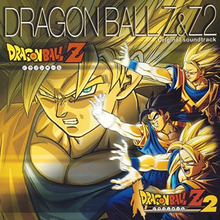- Dragon Ball Z & Z 2 Original Soundtrack
-
Dragon Ball Z & Z 2 Original Soundtrack Soundtrack album by Kenji Yamamoto Released January 19, 2005 Genre Anime/Video Game Length 68:28 Language Japanese Label Team Entertainment Budokai Soundtrack chronology Dragon Ball Z & Z 2 Original Soundtrack Dragon Ball Z 3 Original Soundtrack Dragon Ball Z & Z 2 Original Soundtrack (ドラゴンボールZ & Z2 オリジナルサウンドトラック Doragon Bōru Zetto ando Doragon Bōru Zetto Tzu Orijinaru Saundotorakku) is the official licenced soundtrack of the first two Dragon Ball Z video games for the PS2 and Gamecube by the same name (known as Dragon Ball Z: Budokai 1 & 2 in English speaking countries). It was released by Team Entertainment on January 19, 2005 in Japan only. [1]
Contents
Album information
This release was unique in the fact that composer Kenji Yamamoto collaborated with not just the standard Japanese performers of American as well as Japanese artists. American credits include Steve Lukather guitarist of the 80's rock band Toto and 70's R&B Soul Funk band Tower of Power who performed can predominately be heard on tracks 22-24, but despite these credits the album remains a Japanese exclusive. Because this release focuses on the first two PS2 DBZ games, many of Yamamoto's Orchestrated tracks heard in the story modes of both games were left out. Prompting many fans digitally rip music straight from the games themselves. For the most part, the tracks feature are very rock oriented with only a few featuring a jazzy funk vibe thanks in part to Tower of Power's influence. The back of the jewel casing lists both Japanese and English track listings for the songs, but the English list is not a direct translation of the Japanese. Instead, they are the names that were provided when the games were release as Budokai and Budokai 2. Easily giving the impression that the soundtrack producer anticipated a big demand of importing the album by fans in English speaking countries. Coupled with the soundtrack is a bonus DVD featuring the intro and music videos of the opening theme "Kusuburu heart ni Hi o Tsukero" performed by Hironobu Kageyama, and montage game footage.
Track listing
- くすぶるheartに火をつけろ!!
Kusuburu heart ni Hi o Tsukero!!/Light a Fire in your Smouldering Heart!! - Big Opportunity
- Expectation
- 熱き風のごとく
Atsuki Kaze no Gotoku/Like A Burning Wind - 勝利への疾走
Shōri e no Shissō/Running Towards Victory - Move Forward Fearlessly
- 挑戦者たち
Chōsensha-tachi/Challengers - Breaking Free
- 決戦へのカウントダウン
Kessen e no Kauntodaun/Countdown to the Decisive Battle - 戦慄の刻(とき)
Senritsu no Toki/It's Thrilling Time - 最強の力
Saikyō no Chikara/Super Strength - BUDO~Asian Spirit~
- FLaSH RuN aCRoSS THe UNiVeRSe
- Spark of Fighting
- A lot of'Qi'
- 限界を超えて~`Qi'No Limit~
Genkai o Koete ~'Qi' No Limit~/Breaking The Limit: 'Qi' No Limit - I Trust My 7th Sense~至高の力を信じて~
I Trust My 7th Sense ~Shikō no Chikara o Shinjite~ /I Trust My 7th Sense: Believe in the Supreme Power - 遭遇
Sōgū/Encounter - 未知の邦[くに]から来た戦士
Michi no Kuni Kara Kita Senshi/Warrior From An Unknown Land - The Battle With All My Force
- 野性の魂~Wild Soul~
Yasei no Tamashii ~Wild Soul~/Wild-Natured Spirit: Wild Soul - Soul Vaccination
- Only so Much Oil in the Ground
- Soul With A Capital'S'
- I'm Gonna Get Over~地平線の彼方へ~
I'm Gonna Get Over ~Chiheisen no Kanata~/I'm Gonna Get Over: The Other Side Of The Horizon - Do It At All Risks
- Full Of Tears~悲しみの淵で~
Full of Tears ~Kanashimi no Fuchi de~/Full of Tears: In The Depths Of Sadness - The Man Called 'C'
Track Name Changes
When the games were released in English speaking countries, names of various tracks including the theme song were changed in order to localize despite that this soundtrack has not been released in English speaking countries. As follows are those changes.
1.Go For It!!
4.Take It On!!
19.A StrangerReception
The compositions were met with positive reviews by various gaming critics. Many critics who reviewed the first Budokai game assumed that the music, like the voice talent, was Faulconer's compositions straight from the anime. Sites like IGN[2][3] and GameSpy consider the music the strongest feature of Budokai.[4] Michael Knutson of GameZone though the tracks in Budokai 2 were upbeat and would not get repetitive.[5] Mr. Nash of the Armchair Empire first says that it doesn't hold up but then goes on to say "The music works just fine for adding atmosphere to the fights".[6]
References
- ^ "Dragon Ball Z & Z 2 Original Soundtrack" (in Japanese). Team Entertainment. http://www.team-e.co.jp/products_new/kdsd-00042/index.html. Retrieved February 12, 2009.
- ^ Dunham, Jeremy (December 1, 2002). "Dragon Ball Z: Budokai, The popular localized anime sees its greatest fighting incarnation ever, but that doesn't necessarily make it good.". IGN. http://ps2.ign.com/articles/379/379000p3.html. Retrieved February 12, 2009.
- ^ Dunham, Jeremy (December 2, 2003). "Dragon Ball Z Budokai 2, Why is it that Saiyans can save the world and destroy everything but can't take out the trash or mow the lawn?". IGN. http://ps2.ign.com/articles/442/442606p3.html. Retrieved February 12, 2009.
- ^ Padilla, Raymond (January 6, 2003). "Dragon Ball Z: Budokai (PS2)". GameSpy. http://ps2.gamespy.com/playstation-2/dragon-ball-z-budokai/5511p1.html. Retrieved February 12, 2009.
- ^ Knutson, Michael (December 18, 2003). "Dragon Ball Z: Budokai(tm) 2 Review". GameZone. http://ps2.gamezone.com/gzreviews/r22769.htm. Retrieved February 12, 2009.
- ^ Mr. Nash (March 22, 2003). "Dragonball Z: Budokai Score: 6.8/10". The Armchair Empire. http://www.armchairempire.com/Reviews/ps2/dragonball-z-budokai.htm. Retrieved February 12, 2009.
Categories:- Dragon Ball soundtrack albums
- Video game soundtracks
- 2005 soundtracks
- くすぶるheartに火をつけろ!!
Wikimedia Foundation. 2010.

